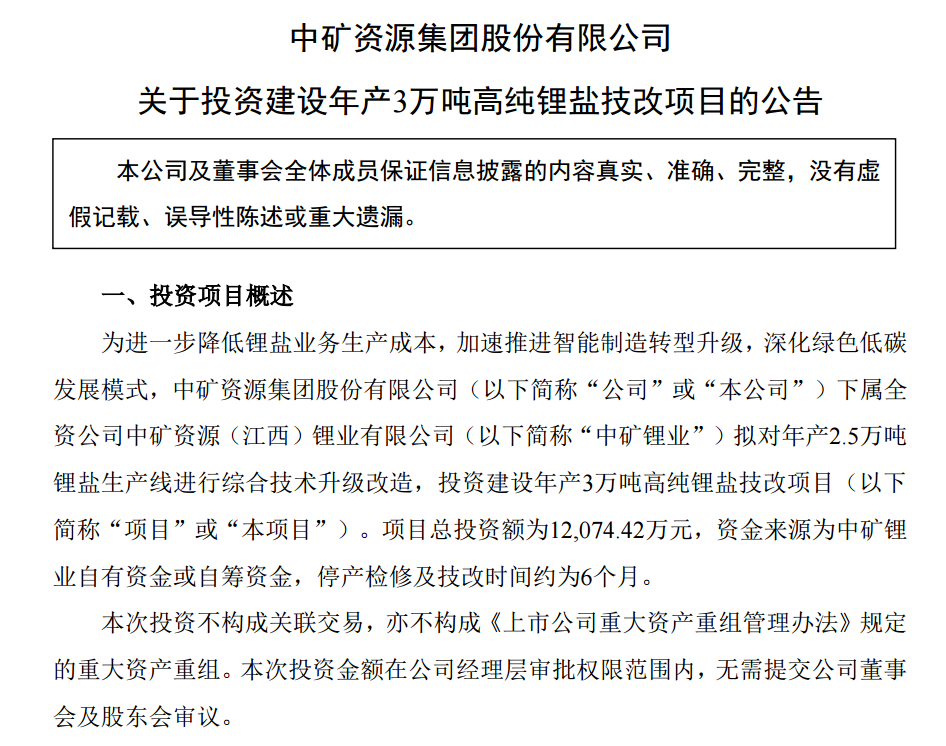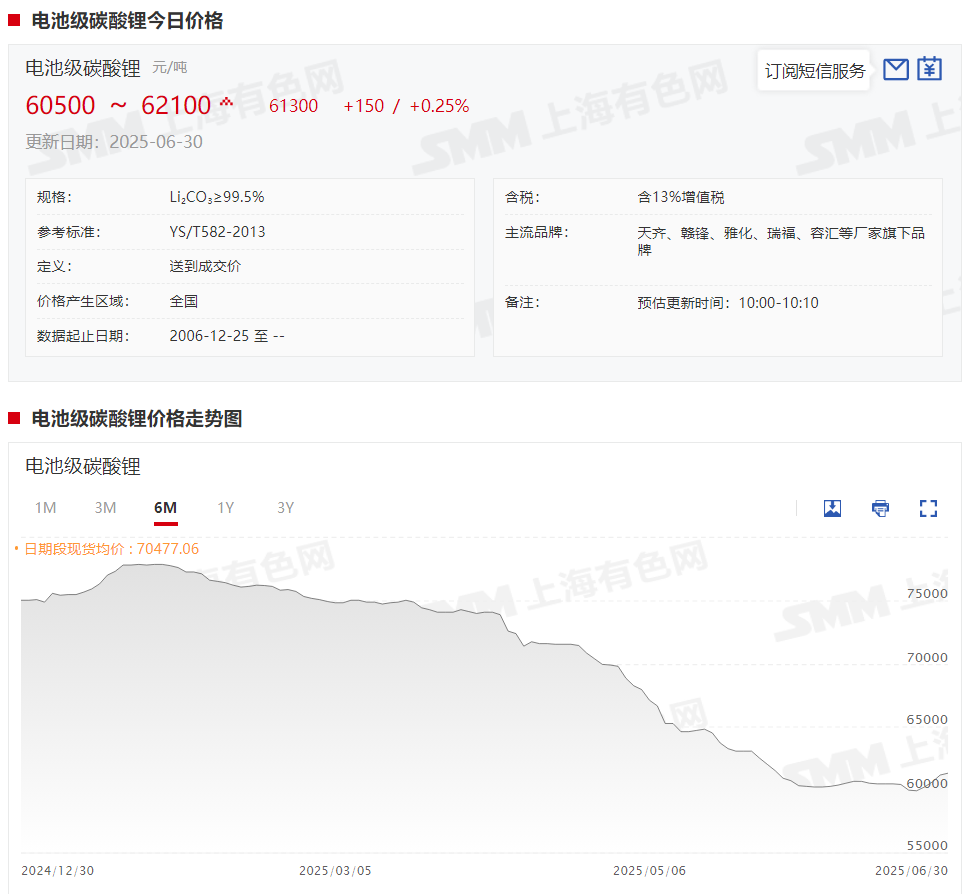SMM reported on June 30: Sinomine Resource Group recently announced that in order to further reduce the production costs of its lithium chemicals business, accelerate the transformation and upgrading of intelligent manufacturing, and deepen the green and low-carbon development model, Sinomine (Jiangxi) Lithium Industry Co., Ltd. (hereinafter referred to as "Sinomine Lithium"), a wholly-owned subsidiary of Sinomine Resource Group Co., Ltd., plans to comprehensively upgrade and transform its 25,000 mt/year lithium chemicals production line and invest in the construction of a 30,000 mt/year high-purity lithium chemicals technological transformation project. It is reported that the total investment for this project is approximately 120.7 million yuan, with the funding source being Sinomine Lithium's own funds or self-raised funds. The shutdown for maintenance and technological transformation is expected to last approximately six months.

The announcement reveals that Sinomine Lithium currently has a 25,000 mt/year lithium chemicals production line and a 35,000 mt/year high-purity lithium chemicals production line. The 25,000 mt/year lithium chemicals production line was invested in and completed by Sinomine New Materials in August 2021. To enhance operational efficiency, the company effectively integrated its lithium chemicals business and transferred the 25,000 mt/year lithium chemicals production line from Sinomine New Materials to Sinomine Lithium in April 2025. This project is centered around the shutdown and technological transformation of the 25,000 mt/year lithium chemicals production line and will not affect the 35,000 mt/year high-purity lithium chemicals production line.
Regarding the impact of this project investment on the company, Sinomine Lithium stated that the technological level, energy consumption, and raw material consumption of this project's production process have all reached the advanced level of similar domestic facilities, with pollutant emissions meeting relevant national standards. The project minimizes the discharge of three wastes (waste gas, waste water, and solid waste), with production waste slag being usable as building material raw materials and system water achieving closed-loop circulation except for evaporation, thus realizing low-carbon and green production. The project optimizes traditional roasting equipment, roasted material handling methods, and solution treatment processes, further improving lithium metal recovery rates and effectively reducing lithium chemicals production costs. Therefore, this project is both feasible in terms of technological process and economic benefits, and will assist the company in achieving high-quality and sustainable development. After the project is completed and put into operation, the company will have a total annual production capacity of 71,000 mt of battery-grade lithium chemicals, further enhancing the comprehensive competitiveness of its lithium chemicals business and better enabling it to cope with industry changes and market challenges.
Meanwhile, Sinomine Resource Group also stated that given this project is centered around the shutdown and technological transformation of the 25,000 mt/year lithium chemicals production line, it will have a certain impact on the production and sales of the company's lithium chemicals business during the project construction period.
It is worth mentioning that previously, when discussing the operational situation of the company's lithium battery new energy sector, Sinomine Resource Group mentioned that in 2024, the company's self-owned mines achieved a total sales volume of 39,477 mt of lithium chemicals, up 164% YoY. The company fully leverages its resource advantages, adjusting the raw material supply structure and increasing the proportion of spodumene concentrates to reduce the production cost of lithium chemicals. Despite significant fluctuations in the market prices of lithium chemical products in 2024, the company effectively mitigated market risks and smoothly navigated the industry cycle through operational strategies and cost-reduction measures, including a substantial increase in the self-sufficiency rate of lithium ore, adjusting the raw material supply structure, expanding municipal power supply capacity, and constructing PV power plants. In the future, the company plans to invest in and construct a 30,000 mt/year lithium sulfate plant in Zimbabwe, which is expected to further reduce transportation costs and thereby lower the production cost of lithium chemicals.
Regarding the company's lithium mine layout, it is reported that since the acquisition of the Bikita mine in Zimbabwe by Sinomine Resource Group in 2022, the company has completed three successive reserve increases leveraging its unique geological exploration technology advantages. The retained lithium ore resources have increased from 29.414 million mt to 113.3517 million mt, and the lithium carbonate equivalent (LCE) has increased from 849,600 mt to 2.8847 million mt. The "2 million mt/year (spodumene) construction project of the Bikita lithium mine" and the "2 million mt/year (petalite) expansion project of the Bikita lithium mine" invested in and constructed by the company were completed and officially commissioned for trial production in July 2023. On November 9, 2023, after orderly equipment installation, commissioning, and trial production, the aforementioned two projects achieved stable production, reaching the designed production capacity and product quality, and achieving full production and compliance with standards. The two projects produce approximately 300,000 mt of spodumene concentrates and 300,000 mt of chemical-grade petalite concentrates annually, respectively, significantly increasing the self-sufficiency rate of raw materials for the company's lithium chemicals business.
In Q1 2025, Sinomine Resource Group achieved sales of 8,964.43 mt of lithium chemical products, up 13% YoY. However, influenced by market fluctuations in the lithium battery and new energy industry, the selling price of lithium chemical products declined significantly YoY, leading to a decrease in the gross profit margin of the company's lithium battery and new energy business. Facing downward pressure in the industry, the company actively implemented various cost-reduction and efficiency-enhancement measures to mitigate the risks of market price fluctuations.
Regarding lithium chemical prices, according to SMM spot quotes, since late January, the spot quotes for battery-grade lithium carbonate have generally shown a downward trend, until occasional upward movements were observed in June. On June 24, the average spot price of lithium carbonate once fell to 59,900 yuan/mt, officially breaking below the 60,000 yuan/mt threshold. Since June 25, the spot quotes for lithium carbonate have rebounded from the lows and have now risen for four consecutive days. As of June 30, the spot quotes for battery-grade lithium carbonate have risen to 59,900-62,100 yuan/mt, with an average price of 61,300 yuan/mt, representing an increase of 1,400 yuan/mt from the previous low of 59,900 yuan/mt, or a 2.34% increase.
》Click to view spot quotes for new energy products
According to SMM, although the center of lithium carbonate transactions has shifted significantly higher compared to before, the overall lithium carbonate market still faces an oversupply situation, with no significant relief in the supply-demand imbalance. Early last week, the average price of battery-grade lithium carbonate fell below the 60,000 yuan/mt threshold. Downstream cathode material enterprises maintained just-in-time procurement, and the market transaction atmosphere remained sluggish. Entering the mid-week to late-week period, lithium carbonate prices stopped falling and rebounded, with the average price of battery-grade lithium carbonate gradually recovering to around 60,600 yuan/mt. However, the price rebound was not accompanied by substantial improvements in demand. Downstream material enterprises still adopted a cautious procurement strategy, preferring to lock in costs through increased long-term agreements to mitigate price fluctuation risks. On the supply side, market liquidity remained abundant. Leading lithium chemical plants maintained relatively firm quotes due to support from long-term agreements, while some small and medium-sized producers, affected by inventory pressure, had a strong willingness to sell, resulting in a differentiated market quote situation.




